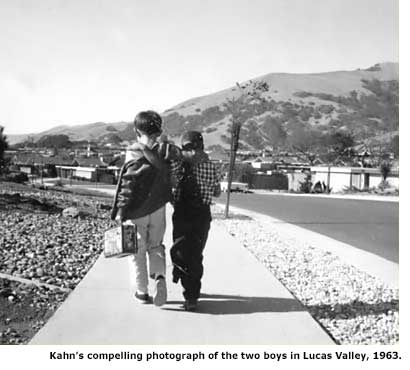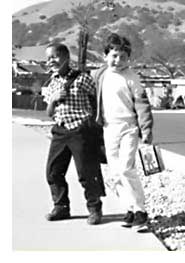Image That Moved Eichler
The picture was vividly clear: two young boys—one black, the other Asian-Caucasian—their arms around each other, strolling home from school to their Eichler neighborhood in Lucas Valley—in perfect harmony, without a care in the world.
That was the image, alright. It was this photograph, according to legend, that moved builder Joe Eichler in a profound way and, by his own admission, literally provided the sense of purpose Eichler needed to rise each day and pour the next slab of concrete, the other foundation of his life's work.
After scores of interviews over the years covering the origins of the Eichler homes, we had become intimately aware of that photograph, even haunted by references to it; but had never actually laid eyes on it. Yet our wondering persisted: how could such a simple, unassuming image of two small children consume a grown man's soul?

After a while pieces of the puzzle began to come together. Each new anecdote, it seemed, led to another. Eventually an internet search cleared a path to the family of Albert E. Kahn—photographer, author, and nephew of Albert Kahn the modernist industrial architect—who died of a heart attack while driving his car at age 67 in 1979.
"That photograph was not accidental," Brian Kahn said firmly, recalling his late father Albert, a self-proclaimed "radical in the tradition of Jack London" and outspoken critic of the government in the 1950s McCarthy era. "The two children in the photo reflected my father's view of the only type of society worthy of humanity. It is a statement about an alternative world, one my father believed would come." It also was no accident that Joe Eichler and Albert Kahn had crossed paths. They apparently had much in common. "I have a vague recollection that there was more to it than business," offered Brian Kahn. "I remember my dad telling me about Eichler—his respect for what they were trying to do." Presumably Joe Eichler initially had become aware of Albert Kahn the book author, who had become well known in the 1940s for his anti-fascist best-selling exposés. After the war, Kahn continued to write and publish prolifically, but turned his attentions to battling America's new "cold war" politics, which for Kahn conflicted with the Franklin Roosevelt policies he personally had supported. Because of his outspoken criticism of U.S. foreign and domestic policy, Kahn became blacklisted in the 1950s, appeared several times before committees investigating his alleged un-American activities, and as reported in his obituary, his passport was revoked, phone tapped, mail opened, and his movements closely monitored by the FBI.

As a tenacious critic of government deceptions, Kahn refused to give in. "As far as I was concerned, I was acting in the American tradition of Thomas Jefferson and Thomas Paine and the framers of the constitution," Kahn said in an interview shortly before his death. "The idea of any government telling me that I owe unequivocal allegiance to it is the most repugnant thing on earth." In 1955, Kahn struck back when he self-published "False Witness," which exposed the confessions of an FBI informer who, it was alleged, was a paid government witness who delivered perjurous testimony in the midst of blacklisting operations.
All of this turmoil, however, did have an impact on Kahn's livelihood. When he began to experience difficulty finding a willing publisher to issue his books, he turned to photography, out of necessity, to support his family. "My father had a natural sense of composition, and also a special affinity for children," remembered Brian Kahn. "His politics were socialist, and he felt deeply that all children, as the hope of humanity, deserved full and equal opportunity."




